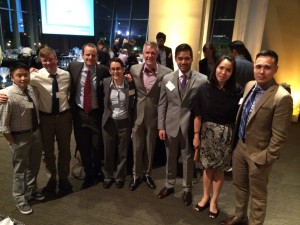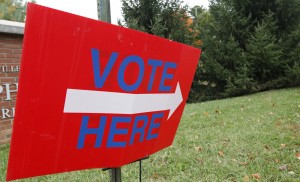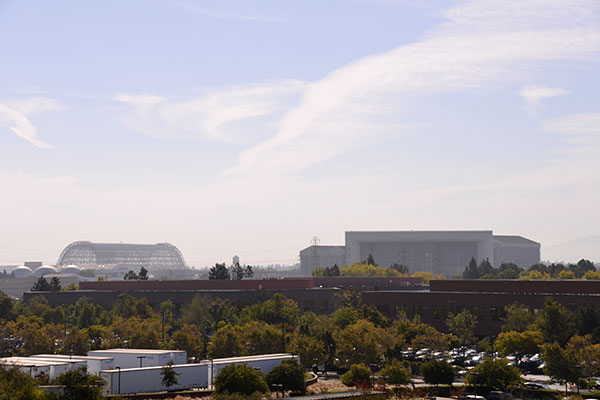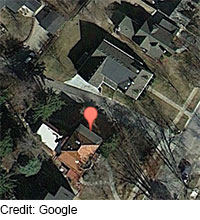Lambda Legal is the oldest and largest legal organization in the United States committed to achieving full civil equality for the lesbian, gay, bisexual, and transgender community, as well as those living with HIV. It is a nonprofit organization that aims to achieve positive change within these diverse communities through means such as impact litigation, education, and public policy advocacy.
On April 25, 2014, Lambda Legal held its annual San Francisco Soirée at City View at the Metreon in the heart of San Francisco. Justia had the honor of being a gold event sponsor this year and sent a contingent of employee representatives from our headquarters in Mountain View to be present at the event.
As a company that works with educational, public interest and other socially focused organizations to make legal materials and consumer resources free and easily accessible online, Justia’s sponsorship of the Lambda Legal San Francisco Soirée was a natural extension of a mission our company has been exemplifying since its inception. Many of our employees are lawyers or have an educational or professional background in law, as well as contribute to the various online public interest projects, legal aid, civil rights, and educational projects in which Justia is involved. Attending the Lambda Legal event as a sponsor offered us not only the opportunity to financially support an organization with a mission complementary to Justia’s but also to keep abreast of Lambda’s most recent advocacy work on behalf of LGBT individuals nationwide.


 Justia Opinion Summary:
Justia Opinion Summary:  Dawson Farms challenged the RMA’s denial of its crop-insurance claim alleging loss due to “tuber rot” in stored potatoes. A final agency review affirmed the RMA’s denial of Dawson Farms’ claim, finding that the insurance adjuster’s sampling of the stored potatoes followed adequate sample procedures. Dawson Farms appealed the final agency decision to the district court, which affirmed. The court believed that, in light of the nature of the hearing officer’s finding under review, the deputy director’s statements made it reasonably discernable that the deputy director applied the correct legal standard and considered the record for the proper purpose of reviewing the hearing officer’s decision for substantial evidence. The hearing officer based his conclusion largely on the testimony of an expert in potato pathology. The court also believed that, to the extent the deputy director’s determination was a rejection of the hearing officer’s finding that the adjuster had a duty to re-sample, the issue under review was a question of law. Consequently, the court found no abuse of discretion or arbitrary and capricious action by the deputy director. Further, the agency determination was supported by substantial evidence.
Dawson Farms challenged the RMA’s denial of its crop-insurance claim alleging loss due to “tuber rot” in stored potatoes. A final agency review affirmed the RMA’s denial of Dawson Farms’ claim, finding that the insurance adjuster’s sampling of the stored potatoes followed adequate sample procedures. Dawson Farms appealed the final agency decision to the district court, which affirmed. The court believed that, in light of the nature of the hearing officer’s finding under review, the deputy director’s statements made it reasonably discernable that the deputy director applied the correct legal standard and considered the record for the proper purpose of reviewing the hearing officer’s decision for substantial evidence. The hearing officer based his conclusion largely on the testimony of an expert in potato pathology. The court also believed that, to the extent the deputy director’s determination was a rejection of the hearing officer’s finding that the adjuster had a duty to re-sample, the issue under review was a question of law. Consequently, the court found no abuse of discretion or arbitrary and capricious action by the deputy director. Further, the agency determination was supported by substantial evidence. Apple, Inc. was hit with a patent infringement lawsuit Thursday (read it below) alleging that the company’s iPad 3 tablets and Macbook Pro computers violate four light emitting diode (LED) patents. The case was filed in in federal court in Delaware by claimed patent holder LED Tech Development LLC, a Delaware limited liability company based in Tyler, Texas, the city that is a patent litigator’s
Apple, Inc. was hit with a patent infringement lawsuit Thursday (read it below) alleging that the company’s iPad 3 tablets and Macbook Pro computers violate four light emitting diode (LED) patents. The case was filed in in federal court in Delaware by claimed patent holder LED Tech Development LLC, a Delaware limited liability company based in Tyler, Texas, the city that is a patent litigator’s  The
The  Here is a summary of legal developments in five federal and state court cases last week that involved technology companies, or alleged activities by their users.
Here is a summary of legal developments in five federal and state court cases last week that involved technology companies, or alleged activities by their users. In a few days, several of us here at Justia will be traveling to “gorges” Ithaca, New York, to attend the
In a few days, several of us here at Justia will be traveling to “gorges” Ithaca, New York, to attend the 

 Tomorrow brings one of the most highly anticipated decisions by the U.S. Supreme Court in recent years: the ruling on the constitutionality of the health-care law that is arguably the crowning achievement of President Obama’s first term in office. Incidentally, tomorrow also marks the one-year anniversary of the launch of
Tomorrow brings one of the most highly anticipated decisions by the U.S. Supreme Court in recent years: the ruling on the constitutionality of the health-care law that is arguably the crowning achievement of President Obama’s first term in office. Incidentally, tomorrow also marks the one-year anniversary of the launch of  For several years, Michael Feloney used his neighbor Robert Baye’s driveway to turn his vehicle to enter his garage. Eventually Baye decided to build a retaining wall on his driveway, which prevented Feloney from using Baye’s driveway. Feloney sued Baye, requesting the district court to impose a prescriptive easement on Baye’s driveway for ingress and egress. The district court granted summary judgment for Baye, concluding (1) Feloney’s use of the driveway was permissive under the “unenclosed land” rule, which provides an exception to the rule presuming adverseness when the use is over unenclosed land; and (2) thus Feloney could not prove the elements required for a prescriptive easement. The Supreme Court affirmed but for different reasons, holding (1) the presumption of permissiveness arises when the land is unenclosed wilderness and does not apply in urban settings such as in this case; (2) when the owner of a property has opened or maintained a right of way for his own use and the claimant’s use appears to be in common with that use, the presumption arises that the use is permissive; and (3) Feloney’s use of Baye’s driveway was presumptively permissive under this rationale.
For several years, Michael Feloney used his neighbor Robert Baye’s driveway to turn his vehicle to enter his garage. Eventually Baye decided to build a retaining wall on his driveway, which prevented Feloney from using Baye’s driveway. Feloney sued Baye, requesting the district court to impose a prescriptive easement on Baye’s driveway for ingress and egress. The district court granted summary judgment for Baye, concluding (1) Feloney’s use of the driveway was permissive under the “unenclosed land” rule, which provides an exception to the rule presuming adverseness when the use is over unenclosed land; and (2) thus Feloney could not prove the elements required for a prescriptive easement. The Supreme Court affirmed but for different reasons, holding (1) the presumption of permissiveness arises when the land is unenclosed wilderness and does not apply in urban settings such as in this case; (2) when the owner of a property has opened or maintained a right of way for his own use and the claimant’s use appears to be in common with that use, the presumption arises that the use is permissive; and (3) Feloney’s use of Baye’s driveway was presumptively permissive under this rationale.